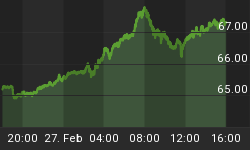Special Guest John Butler: John Butler is the publisher of the "Amphora Report", Author of "The Golden Revolution" and is Chief Investment Officer at Amphora; Atom Capital

John Butler has 18 years experience in the global financial industry, having worked for European and US investment banks in London, New York and Germany. Prior to launching the Amphora Commodities Alpha Fund he was Managing Director and Head of the Index Strategies Group at Deutsche Bank in London, where he was responsible for the development and marketing of proprietary, systematic quantitative strategies for global interest rate markets. Prior to joining DB in 2007, John was Managing Director and Head of European Interest Rate Strategy at Lehman Brothers in London, where he and his team were voted #1 in the Institutional Investor research survey. In addition to other research, he publishes the Amphora Report newsletter which appears on several major financial websites. A cum laude graduate of Occidental College in California, John holds a Masters Degree in International Finance and Economics from the Fletcher School of Law and Diplomacy, associated with Harvard and Tufts Universities.
Published 11-07-14
25 Minutes
John Butler saw first hand during his years with Deutsche Bank and Lehman Bros (prior to its collapse), mounting evidence of Wall Street's "natural self discipline and internal self regulation of risk taking activity being pushed aside and a huge industry bias towards excessive leverage and risk taking control". He knew it could not end well which led him to become independent of this growing institutional mindset and to search for alternative approaches.
"... valuations versus real assets is the key element of the end game"
He recognized that FINANCIAL REPRESSION was fundamentally about limiting investor choice and to further this institutional direction of increasing risk taking to finance government debt. He has therefore came to define Financial Repression from the standpoint of both a narrow and broad definition:
Financial Repression
BROAD DEFINITION: "Any Policy that constrains the ability of the financial markets and investor participants in these markets to take rational actions to invest, diversify and manage the risk of their investment as they would personally prefer to do."
NARROW DEFINITION: "A specific tool kit of policies implemented by government which indirectly confiscate the wealth of the private sector and move it to a combination of the public sector and/or "too large to fail" institutions."
FINANCIAL REPRESSION IS ABOUT LIMITING INVESTMENT CHOICE
"The whole point of financial repression is to make it difficult or impossible for an investor to protect themselves"
John feels Financial Repression "is now extremely broad based (globally) and in fact you have to look very closely to find countries not actively pursuing some mix of Financial Repression policies."
A Negative Sum Game
Butler has argued in his Amphora Report that competitive currency debasement is "is not a zero sum game but rather a negative sum game because policy makers don't realize that by trying to devalue against each other, unseen they are undermining the very credibility of unbacked fiat currencies generally."
Increasing the BRICS are "becoming increasingly wary of where all this is going and as a consequence are diversifying not only their fiat currency reserves but are diversifying into gold, oil fields and real assets generally."
How Investors Protect Themselves
"The only free lunch in economics is DIVERSIFICATION. The problem is that in a world of Financial Repression, the way you diversify yourself is very different than a world where financial represion is not an issue."
"There is no way out but Currency Debasement"
John outlines in this video specifically what the "new diversification" must consist of.
He believes the Fed "will blink" as the US dollar continues to rise as a consequence "of the deflationary pressures which are spreading across the world." He sees evidence of a major trend reversal coming in 2015 and possibly before the end of 2014.















